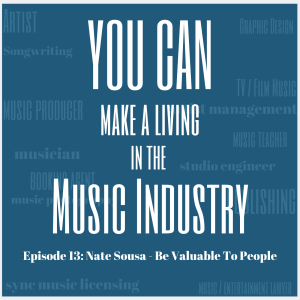

22.7K
Downloads
78
Episodes
Did you know that YOU CAN make a living in the music industry? Celebrities, working class musicians and people just like you who work behind the scenes in all areas of the music business will share their stories, encourage you and give you tools and how-to examples of the ways YOU CAN make a living doing what you love in the music industry.
Episodes

Monday Jan 27, 2020
Episode 13: Nate Sousa - Be Valuable To People
Monday Jan 27, 2020
Monday Jan 27, 2020

Show Notes:
Today I am talking with my buddy Nate "The Sooze" Sousa. He is the music director at Fellowship Bible Church in Brentwood, TN and he is also one of the founders of the guitar amp profiling company Tone Junkie which records and captures amp sounds for digital amplifiers that guitar players can buy online. Our conversation covers what is needed when you want to work as a worship leader or music director in a church of any size. Plus, we talk about the ever present need for strong relationships in ministry as well as how putting together multiple jobs in music can allow you to make a great living without the need to feel like you have to be famous to do so.
Sponsors: Edenbrooke Productions - We offer consulting services and are offering listeners a 1-hour introductory special. To request more info on consulting services, email Marty at contact@johnmartinkeith.com.
Talking Points:
*Nate is the music director at Fellowship Bible Church in Brentwood, TN.
*My dad helped start a band called The Motowns which later became Tower of Power.
*Dad became a worship leader and I was raised in a musical household. I became the drummer for my dad at church when I was in 5th grade.
*I realized my dad did this for a living and I saw that you can make a living doing music.
*I went to college at Azusa Pacific University and majored in music and took theory and arranging and hymnology (the study of hymns) which was a great overview of old church music.
*I decided to change majors from music to theology because I liked the church history part of it. I wanted to be musically proficient and know how theory worked but I also needed to know the Bible and needed a solid foundation for Truth.
*Then I went to Fuller Theological Seminary and studied Theology (The Study of God) and Art and put my two passions together that I wanted to be doing with my life.
*How did you transition from college into the workforce with what you studied? I started looking for churches to work for as a worship pastor or music director.
*Music Director - someone who helps lead the band, creates charts, makes backing tracks using Ableton, arranging, running point on recordings if you can record new songs, etc. It’s a lot of behind the scenes, a lot of prep work. It’s still pastoring people and meeting with people and having those relationships. It doesn’t include that upfront singing and speaking leadership to the congregation.
*My first job was as a worship leader at a small church and even though that particular environment wasn’t my sweet spot I knew it was something I should do.
*Start saying “yes” when something comes along in the realm of what you would like to do, maybe just give a try.
*When you’re just starting out and looking for work it doesn’t help to be super picky at that point necessarily.
*Sometimes it does if your making sure that you are theologically on base with what you know to be true and that the church is also teaching that also because there can be miscommunication and issues if those things don’t line up.
*Make sure your beliefs line up with the church’s beliefs.
*Besides that, you should take any opportunity you can get when you are first starting out.
*I worked as worship leader at that church for six months, then there was a built in check up time with the pastor to see how things were going.
*I learned that singing and leading was not my strong suit so I left that position.
*I learned what I’m good at and not so good at and what I have passion around and don’t have passion around.
*One of the outcomes of being a “yes man” is saying I got experience.
*I started to hone in on becoming a music director and helping worship leaders to take details off their plate.
*Music directors are used mainly in larger churches. Smaller churches don’t need one, they need a worship pastor/music director all in one.
*Wanting a music director position at a church means the number of opportunities goes down exponentially because most churches are smaller and don’t need that position separated from the worship pastor position.
*I got invited by a friend to play at Friend's Church in CA. for a young adults group on Thursday nights which paid a little bit.
*During that time I was finishing school and waiting tables.
*Then they asked me to play on Sundays. I saw a gap that needed to be filled there.
*I built great relationships there. I met the music director there and realized this guy had the job I wanted.
*Find people that are doing what you want to be doing and draft them and follow along what they are doing.
*I would hang out with him all the time and ask lots of questions and go to his office and learn things from him and he basically started mentoring me.
*He showed me Sibelius Notation Software for creating music charts.
*Over time he would ask me to fill in for him to lead the band when he was out of town to the point it became a part time music director assistant position.
*Be valuable to people.
*Go above and beyond.
*After me being involved for about six years, the music director ended up leaving and I was asked to step into that role full time.
*Aaron Blanton from Nashville moved to Friend’s Church to be the one of the worship pastors and we became great friends and worked together to bring the church into a new era musically.
*What does it take to be a music director at a church?
*Best case scenario is handing musicians information they can trust. It’s the skill to chart out music that players can understand.
*Using Planning Center to make sure people have all the resources they need for a Sunday service.
*Make sure mp3 songs are in the right key for rehearsing at home.
*It’s a lot of administration work.
*It’s very relationship based as well.
*I’m the most direct contact with the band people.
*I pastor the worship team differently than the worship leaders would because I have more contact with them because I’m their first point of contact.
*Aaron Blanton moved back to Nashville and became the worship pastor here at Fellowship. He called me and said there was an opening for a music director at Fellowship and my wife and I prayed about it and I came out to interview and felt this was a great place to be.
*The relationship with Aaron was a huge reason to be able to make the move.
*Part of my life in music has been piecing together multiple streams of income.
*While being church music director in California, I became a guitar teacher which allowed me to become a better player.
*I played for a country cover band in Southern California because of a relationship where a friend asked me to play in his band.
*Those things allowed me to do music full time and quit the jobs that were not music related.
*I decided if I was going to be away from my family working then I would like it to be in my wheelhouse.
*I wanted jobs that would all be connected using my skill as a musician to earn money for my family.
*When I moved to Tennessee in addition to music directing at Fellowship I started working with a company called Tone Junkie because of a relationship with the owner John Sullivan.
*We bonded over music gear and got together a couple of times a month and eventually started recording the sessions for people who might enjoy hearing us play and talk about gear.
*We started getting some listeners and subscribers but it took off when John bought a Kemper digital guitar amp which captures the sound of an amp and puts it in the Kemper.
*We started profiling (recording) our amps into the Kemper and offering them for sale online and we sold thousands of our profiles all over the world over the past couple of years.
*We have a website, www.tonejunkiestore.com and podcast.
*Aaron Blanton moved to work for Integrity Music and they needed someone to make worship charts for their company and he asked me to chart music and be a “Song Setter” for that company so I work for them part time.
*A “Song Setter” uses computer programs like Finale or Sibelius where you can input music into charts using just slashes to making scores for movies.
*It’s having the ability to hear music and write it out for musicians to play in churches.
*Integrity Music wants multiple versions with different parts like guitar, piano, vocals etc. so I turn in ten files for each song.
*What is some advice you would give to people wanting to get into playing worship music?
*Don’t be afraid to do jobs that are not 100% what you want.
*Ask what are the reasons to say "yes" and give a job a chance.
*Get the experience. If you wait and wait you still don’t have experience, so jump in with people that are willing to give you a chance.
*Large churches or organizations are not going to hire you to lead thousands of people without experience. Start in smaller churches or venues and get experience leading people and work your way up from there.
*I was not in big bands or anything where everyone knew my name. I found joy in playing church music and it didn’t have to be a stepping stone for something else.
*But if you get invited to go play for someone or do session work or something and that is what you are trying to do, go do it.
*Whatever you are wanting to do, find people who are already doing it and ask them if you can get with them and ask them questions.
*Don’t have an entitlement mentality and assume that you deserve something. That works against you.
*Be humble and generous and have gratitude.
*Pay attention to how you come across to people because people can sense that and it is written all over your face.
www.fellowshipbiblechurch.org to watch live or recorded services.
www.weareworship.com is where you can get charts I create for Integrity Music.
Nate Sousa grew up playing music from an early age, being taught by his father. After studying music in college, he went on to teach private lessons, direct music in churches, play on the road for several years, and do the weekend warrior band thing. Piecing together music gigs has been Nate’s bread and butter for the last 15 years. He is currently the Director of Music at Fellowship Bible church in Brentwood, TN; while also helping to create content for Tone Junkie TV and We Are Worship.
No comments yet. Be the first to say something!